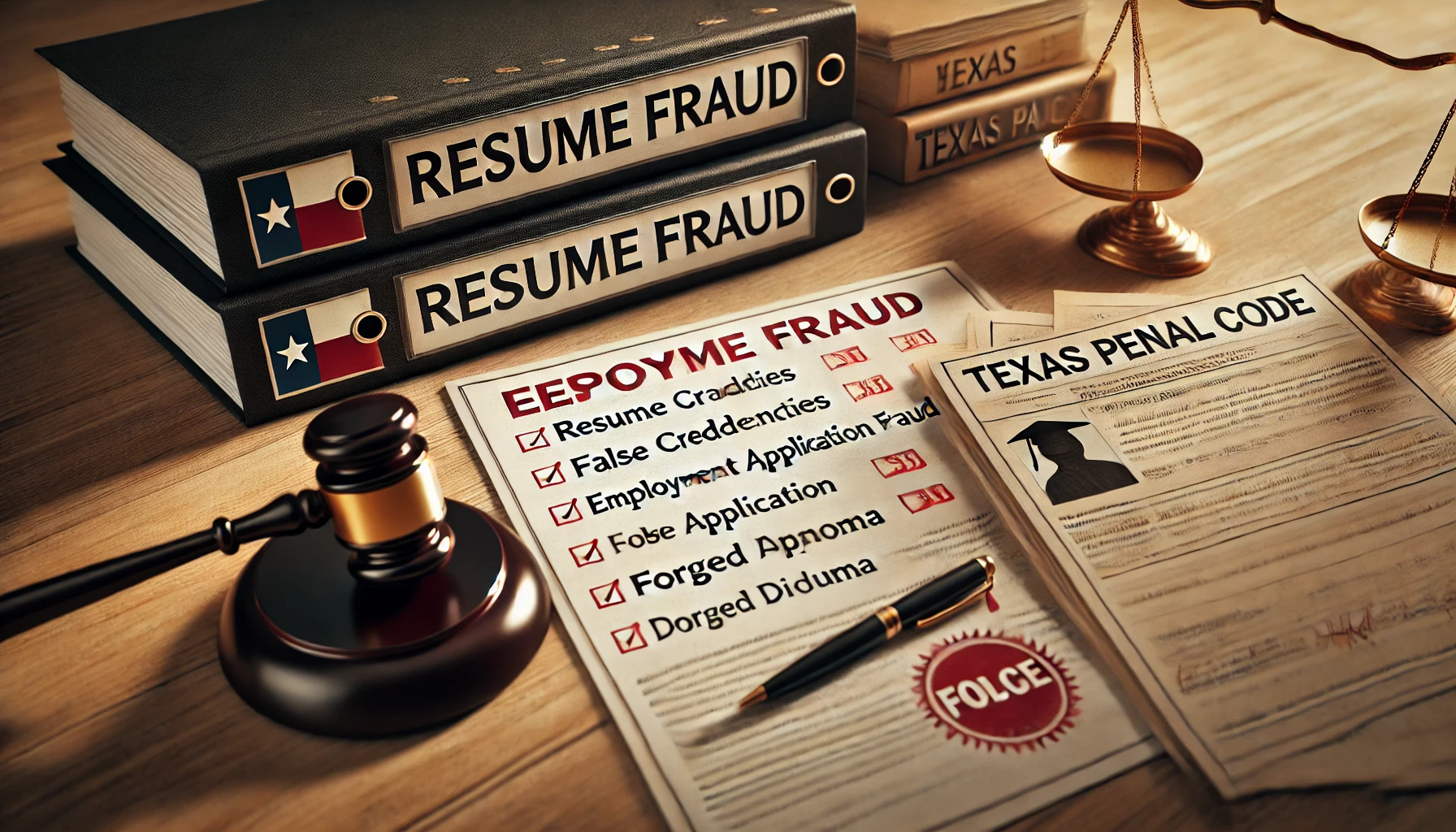

Employment Application and Resume Fraud in Texas: Can It Be Criminal?

Employment Application and Resume Fraud in Texas: Can It Be Criminal?
In today's competitive job market, embellishing a resume or providing false information on a job application might seem like a harmless way to stand out. However, in Texas, such actions can have serious legal consequences. This article explores the legal ramifications of employment application and resume fraud in Texas, outlining the statutes involved, potential penalties, and the importance of honesty in the job application process.Miller IP
Understanding Resume and Application Fraud
Resume and application fraud involves intentionally providing false or misleading information to a potential employer. Common examples include:
- Claiming degrees or certifications not earned
- Falsifying employment history
- Providing incorrect job titles or responsibilities
- Altering dates of employment to cover gaps
- Using someone else's identity or credentials
While some may view these actions as minor exaggerations, they can lead to significant legal issues under Texas law.
Legal Framework in Texas
Several statutes in the Texas Penal Code address fraudulent activities related to employment applications and resumes:
1. Forgery – Texas Penal Code § 32.21
Forgery involves altering or creating documents with the intent to defraud. If an individual forges a diploma, certification, or any other document to support false claims on a resume, they could be charged under this statute. Penalties vary based on the nature of the forged document and the intent behind its use.
2. Fraudulent Use or Possession of Identifying Information – Texas Penal Code § 32.51
Using someone else's personal information, such as a Social Security number or professional license number, to secure employment can lead to charges under this statute. Depending on the number of items involved, this offense can range from a state jail felony to a first-degree felony. LegalClarity
3. False Statement to Obtain Property or Credit – Texas Penal Code § 32.32
Providing false information on a job application to obtain employment can be considered a false statement to obtain property or credit. Employment is viewed as a form of property or credit under this statute, and misrepresenting qualifications can lead to criminal charges.
4. Perjury – Texas Penal Code § 37.02
If a job application includes a sworn statement affirming the truthfulness of the information provided, knowingly providing false information can result in perjury charges. Perjury is a Class A misdemeanor in Texas, punishable by up to one year in jail and a fine of up to $4,000. LegalClarity
Potential Penalties
The penalties for employment application and resume fraud in Texas depend on the specific offense and the circumstances involved:
- Class A Misdemeanor: Up to 1 year in jail and a fine up to $4,000.
- State Jail Felony: 180 days to 2 years in a state jail facility and a fine up to $10,000.
- Third-Degree Felony: 2 to 10 years in prison and a fine up to $10,000.
- Second-Degree Felony: 2 to 20 years in prison and a fine up to $10,000.
- First-Degree Felony: 5 to 99 years or life in prison and a fine up to $10,000.
The severity of the penalty often correlates with the amount of harm caused or the value of the benefit obtained through the fraudulent act.
Civil Consequences
Beyond criminal penalties, individuals found guilty of resume or application fraud may face civil lawsuits from employers. Employers can sue for damages resulting from negligent hiring, especially if the employee's misrepresented qualifications lead to financial loss or harm to clients or customers. LegalMatch
Importance of Honesty in the Application Process
Honesty in job applications and resumes is not only ethical but also legally prudent. Employers often conduct background checks, verify educational credentials, and contact previous employers. Discrepancies can lead to immediate disqualification from the hiring process or termination if discovered after employment begins.
Conclusion
Employment application and resume fraud are serious offenses under Texas law, with potential criminal and civil consequences. Individuals should ensure the accuracy and honesty of all information provided to potential employers.
If you're facing charges related to employment application or resume fraud, it's crucial to seek experienced legal representation. Contact Walker Law Office at (713) 228-2611 or visit https://www.walkerlawhouston.com/contact/to schedule a consultation and protect your rights.


